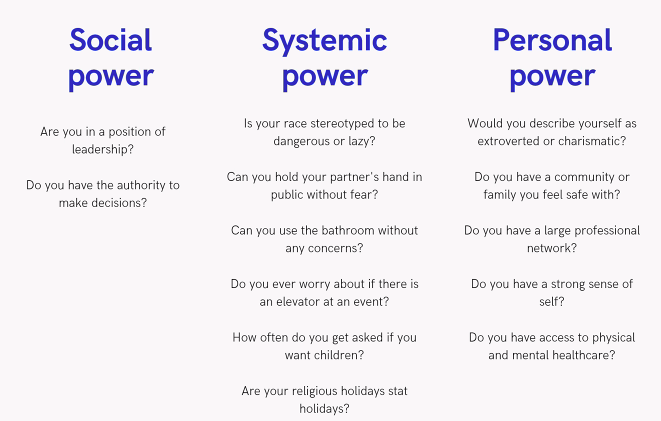I recently attended “A Guide to Inclusive Meetings for Professionals” facilitated by Cicely Belle Blain (love their name!).
My goal was, of course, to learn more about this topic so that I can create, host, and lead more inclusive meetings.
One of my favourite ways of processing information is to write about what I’ve learned. To that end, here are a few notes from the workshop.
Inclusive meetings are needs-based, foster trust and honour intersectionality
Some questions to ask myself when I design a meeting:
- If trust is built when people’s needs are heard and met, how do I determine people’s needs and then help them meet these?
- If trust is built when people are able to contribute, what do I need to do to allow for this?
- How do I plan for and foster trust within my meeting design?
Power
The facilitator created a helpful visual that summarizes 3 types of power: social, systemic and personal.
(shared with permission from the facilitator)
Inclusive meetings redistribute power
Personal power is the easiest to re-distribute. Therefore, we need to think about how we can instill personal power onto others. The facilitator provided some ideas:
Ways to redistribute power
- Collaborate on the agenda
- Notice what is selected as a priority and what is put on hold. Question.
- Value lived experience as knowledge
- Take a needs-based focus
- Practice mentorship as a value rather than restricting it to a formal process
Practicing mentorship as a value, within the context of inclusive meetings, can look like:
- recognize when to advocate
- notice harmful dynamics and step in
- uplift and spotlight others’ ideas
- give frequent and consistent praise
- help other prepare for a meeting and debrief
- give people time to plan
Honouring people’s lived experiences in a meeting
- honour what people bring
- accept (welcome) vulnerability and chaos (e.g., working from home during COVID)
- encourage sharing personal stories
- open with a meaningful check-in and close with inspiring check-out
- affirm people’s decisions around boundaries (note: we have a lot of notions about what “professionalism” looks like)
Needs-based resources in a meeting
- ensure people have the right set up to be present
- schedule when it works for people
- encourage feedback during and after
- circulate the agenda
- be willing to shift and change plans
- allow people to participate in a way that makes sense for them
Favourite quote from the workshop
“Urgency is often more of a mentality than a reality”
Unconscious Bias
- Deeply rooted
- We can’t eradicate
Question to ask yourself: “Do you hold onto that bias because it keeps you safe or because it keeps you comfortable?”
Some forms of bias
- HIPPO Bias (looking to the highest paid person for their opinion)
- Affinity Bias (seeking comfort in those who are like us)
- Confirmation bias (We seek answers we already believe are true)
- Dunning-Kruger Effect (Overconfidence in skills we lack)
- Bandwagon Bias (We’re more likely to believe something if many others believe it too)
Biases don’t have to be harmful, but they can be. The intention is often to preserve status quo.
Workshop follow up resources
- Detour spotting (form of micro aggression; “Attitudes or behaviours that signal a detour or wrong turn into shame, denial or defensiveness” – Jona Olsson). See the Cultural Bridges to Justice Website
- White supremacy characteristics
- Book: Crucial conversations


 Follow
Follow